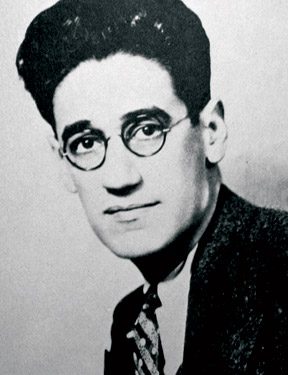- Tickets
- Memberships & Season
- Engage & Learn
- Your Visit
- Support
- Artists
- About
- Accountability
- Ticket Donation Requests
- Financials
- Rentals at the Goodman
- Our History
- Staff & Leadership
- Join the Goodman
- Press Room
- 2024-2025 Season
- 2023 – 2024 Season
- 2022 – 2023 Season
- 2021 – 2022 Season
- 2019 – 2020 Season
- Hershey Felder as Irving Berlin
- Goodman Gala
- A Paris Love Story
- Bernhardt Hamlet
- The Santaland Diaries
- American Mariachi
- School Girls; Or, The African Mean Girls Play
- Molly Sweeney
- graveyard shift
- Roe
- 42nd Annual Production of A Christmas Carol
- Dana H
- Daughter of a Cuban Revolutionary
- New Stages Festival 2019
- 2018 – 2019 Season
- 2017 – 2018 Season
- 2016 – 2017 Season
- 2015 – 2016 Season
- 2014 – 2015 Season
- About the Goodman
Artist Bio

George S. Kaufman
(Bio as of September 2009)
George S. Kaufman was born in Pittsburgh, Pennsylvania. After a brief career as a ribbon salesman, he contributed to the satirical newspaper column of Franklin P. Adams (“F.P.A.”) in the New York Evening Mail; on Adams’ recommendation, he was given a column of his own in the Washington Times in 1912. While serving as a drama critic for The New York Times, he had his first success as a playwright with Dulcy (1921), co-authored with Marc Connelly and based on a character from Adams’ column. Other collaborations with Connelly included Merton of the Movies (1922) and Beggar on Horseback (1924). The Butter and Egg Man (1925), a satirical look at theatrical production, was the only play that Mr. Kaufman wrote alone, and his record of success with other co-writers earned him the title “the great collaborator.” With Edna Ferber he created such classics as The Royal Family (1927), Dinner at Eight (1932) and Stage Door (1936). Some of his greatest successes came during his partnership with Moss Hart, with whom he wrote Once in a Lifetime (1930), Merrily We Roll Along (1934), You Can’t Take It With You (1936) and The Man Who Came to Dinner (1939). Although Mr. Kaufman professed to loathe musicals, he created some of the greatest hits of the genre, including two Marx Brothers vehicles The Cocoanuts (1929) and Animal Crackers (1929), both with Morrie Ryskind, and Of Thee I Sing! (1931), a political satire written with Ryskind and Ira and George Gershwin which became the first musical to win the Pulitzer Prize. (Mr. Kaufman also shared another Pulitzer, for You Can’t Take It With You, with Moss Hart.) Kaufman was also a respected director; besides some of his own plays, his best-known credits included the original productions of The Front Page (1928), My Sister Eileen (1940) and Guys and Dolls (1950). He was also a respected “play doctor,” bringing uncredited assistance to dozens of Broadway-bound plays during his career. Mr. Kaufman was known as one of the most successful writers and directors in the first half of the 20th century; between 1921 and 1958, at least one Kaufman project appeared every season on Broadway. When he died in 1961, his longtime friend and collaborator Moss Hart remarked that “no history of these 40 years in the American theater can be written without George S. Kaufman’s name and influence on it looming large and clear.”






















